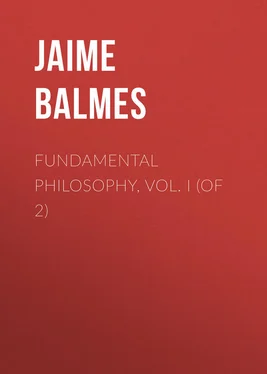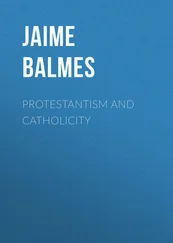Jaime Balmes - Fundamental Philosophy, Vol. I (of 2)
Здесь есть возможность читать онлайн «Jaime Balmes - Fundamental Philosophy, Vol. I (of 2)» — ознакомительный отрывок электронной книги совершенно бесплатно, а после прочтения отрывка купить полную версию. В некоторых случаях можно слушать аудио, скачать через торрент в формате fb2 и присутствует краткое содержание. Жанр: foreign_antique, foreign_prose, на английском языке. Описание произведения, (предисловие) а так же отзывы посетителей доступны на портале библиотеки ЛибКат.
- Название:Fundamental Philosophy, Vol. I (of 2)
- Автор:
- Жанр:
- Год:неизвестен
- ISBN:нет данных
- Рейтинг книги:3 / 5. Голосов: 1
-
Избранное:Добавить в избранное
- Отзывы:
-
Ваша оценка:
- 60
- 1
- 2
- 3
- 4
- 5
Fundamental Philosophy, Vol. I (of 2): краткое содержание, описание и аннотация
Предлагаем к чтению аннотацию, описание, краткое содержание или предисловие (зависит от того, что написал сам автор книги «Fundamental Philosophy, Vol. I (of 2)»). Если вы не нашли необходимую информацию о книге — напишите в комментариях, мы постараемся отыскать её.
Fundamental Philosophy, Vol. I (of 2) — читать онлайн ознакомительный отрывок
Ниже представлен текст книги, разбитый по страницам. Система сохранения места последней прочитанной страницы, позволяет с удобством читать онлайн бесплатно книгу «Fundamental Philosophy, Vol. I (of 2)», без необходимости каждый раз заново искать на чём Вы остановились. Поставьте закладку, и сможете в любой момент перейти на страницу, на которой закончили чтение.
Интервал:
Закладка:
4. It must be remarked that in entering on the examination of the question of certainty, we do not conceal from ourselves its difficulties. To conceal would not be to solve them; on the contrary, the first condition necessary to their complete solution, is to see them with perfect clearness, and to feel their full force. It is no humiliation to the human understanding to seek those limits beyond which it cannot pass, but it is to elevate and confirm it. Thus the intrepid naturalist, when in search of some object he has penetrated to the bowels of the earth, feels a mixture of terror and pride to be thus buried in subterranean caverns, with just light enough to see immense masses barely suspended above his head and unfathomable abysses beneath his feet. There is something sublime, something attractive and captivating in the obscurity of the mysteries of science, in uncertainty itself, in the very assaults of doubt, threatening to destroy in one instant the work accomplished by the human mind only in the space of long ages. The greatest men have at all times enjoyed the contemplation of these mysteries. The genius which spread its wings over the east, over Greece and Rome, over the schools of the Middle Ages, is the same we now behold in modern Europe. Plato, Aristotle, St. Augustine, Abelard, St. Anselm, St. Thomas of Aquin, Luis Vives, Bacon, Descartes, Malebranche, and Leibnitz, all, each in his own way, felt the sublime inspiration of philosophy.
Whatever tends to raise man to lofty contemplation in the sanctuary of his soul, contributes to his aggrandizement; for it separates him from natural objects, reminds him of his noble origin, and proclaims to him his high destiny. In a mechanical and sensual age, when every thing seems opposed to the activity of the powers of the soul, except when they administer to the wants of the body, it is well to renew those great questions in which the mind roams free and untrammelled over unbounden realms of space.
Only intellect can examine itself. The stone falls, but knows not that it falls; the ray calcines and pulverizes, ignorant of its power; the flower knows not that its beauty is enchanting; and the brute beast follows his instincts, but asks not the reason of them. Man alone, a fragile organization, appearing for a moment on earth again to return to the dust, harbors a spirit, which first inspects the external world, and then, anxious to ascertain its own nature, enters into itself as into a sanctuary, and becomes its own oracle. What am I? What do I do? What do I think? What phenomena do I experience within myself? Why am I subject to them? What is their cause, their order of production, their relations? The mind asks itself these questions, – serious and difficult indeed, but noble and sublime questions; an unfailing proof that there is within us something superior to inert matter susceptible only of motion and a variety of forms, that there is something, which, by an internal activity, spontaneous and rooted in our very nature, presents us an image of that infinite Activity, a single act of whose will created the world from nothing. (1) Конец ознакомительного фрагмента. Текст предоставлен ООО «ЛитРес». Прочитайте эту книгу целиком, купив полную легальную версию на ЛитРес. Безопасно оплатить книгу можно банковской картой Visa, MasterCard, Maestro, со счета мобильного телефона, с платежного терминала, в салоне МТС или Связной, через PayPal, WebMoney, Яндекс.Деньги, QIWI Кошелек, бонусными картами или другим удобным Вам способом.
CHAPTER II.
TRUE STATE OF THE QUESTION
5. That we have certainty, common sense assures us, but what is its basis, and how it is acquired, are two difficult questions, which it is for philosophy to answer.
Three very different questions are involved in that of certainty; and if confounded, they contribute not a little to the creation of difficulties, and the confusion of matters which, even when they have their various aspects most accurately marked, are sufficiently hard and complicated.
It will greatly conduce to the due determination of our ideas, carefully to distinguish between the existence of certainty, its basis, and the mode in which it is acquired. Its existence is an indisputable fact; its basis the object of philosophical researches, and the mode of acquiring it frequently a concealed phenomenon not open to observation.
6. That bodies exist is a fact that no man of sane mind can doubt. No questions raised upon this point can ever shake our firm conviction in the existence, without us, of what we call the corporeal world. This conviction is a phenomenon of our existence. Explain it, perhaps we cannot; but we certainly cannot deny it; we submit to it as to an inevitable necessity.
What is the basis of certainty? Here we have not a simple fact, but a question solved by every philosopher in his own way. Descartes and Malebranche recur to the veracity of God; Locke and Condillac to the peculiar character and evolution of certain sensations.
How does man acquire this certainty? He knows not: he had it before reflecting on it; he is astounded to hear it made a matter of dispute, and he might never have suspected it could be asked, why we are certain that what affects our senses exists. It is of no use to ask him how he made so precious an acquisition; he regards it as a fact scarcely distinct from his own existence. He has no recollection of the order of sensations in his infancy; he finds his mind now developed, but is as ignorant of the laws of its development as he is of those which presided over the generation and growth of his body.
7. Philosophy should begin by explaining, not by disputing the fact of certainty. If we are certain of nothing, it is absolutely impossible for us to advance a single step in any science, or to take any part whatever in the affairs of life. A thorough-going skeptic would be insane, and that too with insanity of the highest grade. To such a one, all communication with other men, all succession of external actions, all thoughts, and even acts of the will would be impossible. Let us, then, admit the fact, and not be so extravagant as to say that madness sits on the threshold of philosophy.
It is the part of philosophy to analyze, not to destroy its object; for by destroying its object it destroys itself. Every argument must have a resting-point, which must be a fact. Whether it be internal or external, idea or object, the fact must exist: we must begin by supposing something, and this something we call a fact. Whoever begins by denying or doubting all facts, is like the anatomist, who, before dissecting a corpse, burns it, and casts its ashes to the wind.
8. Philosophy then, it may be said, commences not with an examination, but with an affirmation. Granted, and this is a truth whose admission closes the door on much sophistry, and sheds a brilliant light over the whole theory of certainty.
Philosophers are deceived when they imagine that they begin by doubting. Nothing is more false; when they think, they affirm, if nothing else, at least their own doubt: whenever they reason, they assert the connection of ideas, that is, the whole logical world.
Fichte, who certainly was not easily satisfied with anything, begins to treat of the basis of human knowledge by making an affirmation, and this he confesses with an ingenuousness that does him honor. Speaking of reflection, the foundation of his philosophy, he says: "The rules to which this reflection is subject, are not proved to be valid, but are tacitly presupposed to be known and admitted. They are, in their remotest origin, derived from a principle, the legitimacy of which can only be established on condition that they are valid . This is a circle, but an inevitable circle . But supposing it to be inevitable, and that we frankly confess it so to be, it is, in order to establish the highest principle, allowable to trust all the laws of general logic . We must start on the road of reflection with a proposition conceded by all the world without any contradiction." 1 1 Fichte, Grundlage der gesammten Wissenschaftslehre . Theil. i., § 1. Ed. Berlin, 1845, p. 92.
Интервал:
Закладка:
Похожие книги на «Fundamental Philosophy, Vol. I (of 2)»
Представляем Вашему вниманию похожие книги на «Fundamental Philosophy, Vol. I (of 2)» списком для выбора. Мы отобрали схожую по названию и смыслу литературу в надежде предоставить читателям больше вариантов отыскать новые, интересные, ещё непрочитанные произведения.
Обсуждение, отзывы о книге «Fundamental Philosophy, Vol. I (of 2)» и просто собственные мнения читателей. Оставьте ваши комментарии, напишите, что Вы думаете о произведении, его смысле или главных героях. Укажите что конкретно понравилось, а что нет, и почему Вы так считаете.












